Kurt Gänzl
Encylopedia of the Musical Theatre
1 January, 2020
Ivan Caryll was the principal composer and conductor for the heyday of the Gaiety musical comedy who encouraged the development of a more book-orientated type of comedy musical in a second career in America.
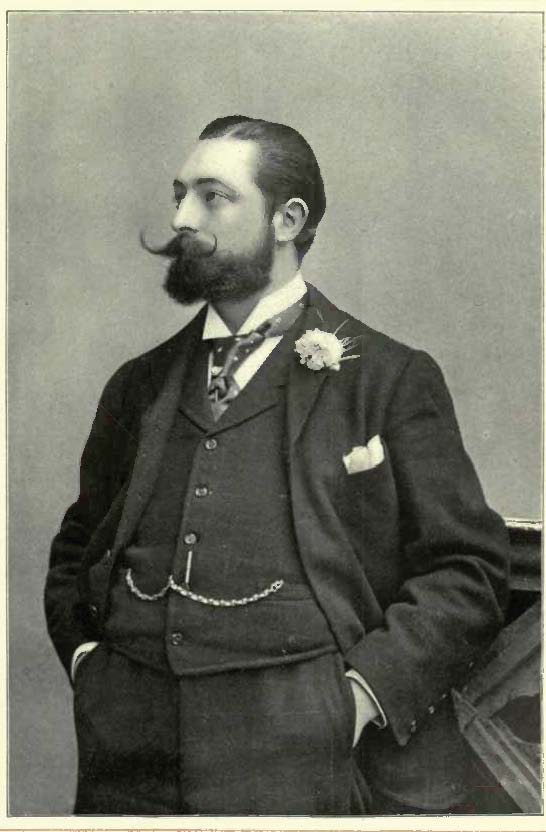
Composer Ivan Caryll with a dashing beard in 1897. (Photo: Alfred Ellis, from the 1903 publication “Good Old Gaiety”)
Born in Liège, Belgium, on 12 May 1861 as Félix Marie Henri Tilkin, Caryll was the son of an industrial businessman, and educated at the Paris Conservatoire. He settled in Britain in the mid-1880s and made the bulk of his career there, becoming, in tandem with Lionel Monckton, the composer for the internationally famous series of musical comedies created at the Gaiety Theatre under the management of George Edwardes in the 1890s and 1900s.
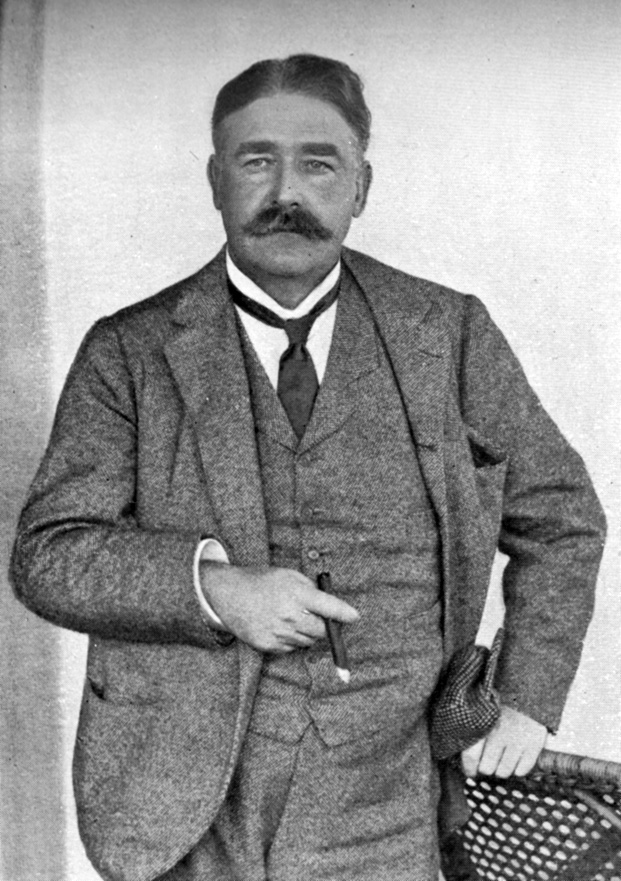
Photograph of George Edwardes by Ellis & Walery, from the 1914 edition of Cellier & Bridgeman’s “Gilbert and Sullivan and Their Operas.”
Caryll’s earliest days in London were spent largely in musical hack work and in teaching. However, he got a serious opportunity as a composer in 1886 while he was working at the Comedy Theatre on the extremely successful comic opera, Erminie. That show’s producer, Violet Melnotte looking for a follow-up to her hit, decided to produce his opéra-comique The Lily of Léoville, a piece written during Caryll’s Parisian days in collaboration with an apparently French librettist, Félix Rémo. Although The Lily of Léoville was a failure, the music gained some fair notice and a German version was subsequently produced in Hamburg (Das Andreasnacht, Carl-Schultze Theater 6 December 1890, ad Friedrich Wilhelm Wulff, W Behre). It was to be several years before Caryll gained a second chance at a full score.
In the meanwhile, however, he made contact with some of the town’s other important producers, supplying, amongst other journeyman work, four pieces to be interpolated into the score of George Edwardes’s Gaiety burlesque Monte Cristo Jr (1886).
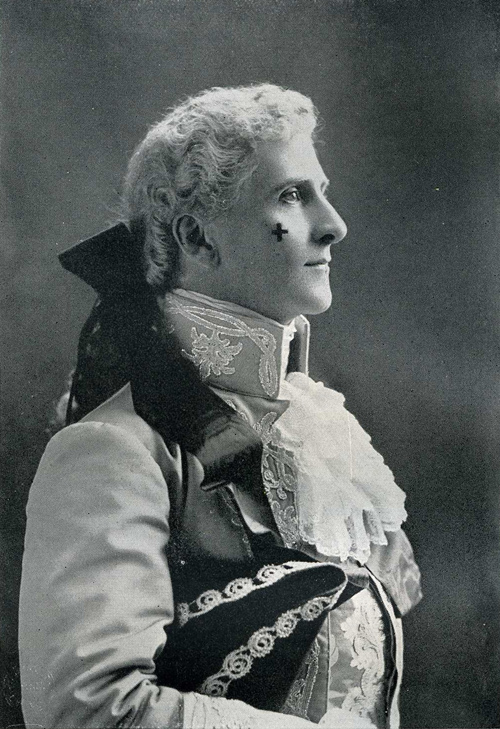
Hayden Coffin as Harry Sherwood in Cellier’s “Dorothy,” 1889. (Photo: Hayden Coffin’s Book / Alston Rivers, London 1930)
It was as a conductor that Caryll made his first noticeable mark. When Henry J Leslie bought the Gaiety theatre production of Dorothy from Edwardes and transferred it to the Prince of Wales Theatre, Gaiety musical director Meyer Lutz remained at his own theatre, and Caryll was appointed conductor for the revamped show which was to become the musical theatre hit of the era. He remained Leslie’s musical director through the whole four years and three shows of the producer’s dramatic career, shifting with him to his new Lyric Theatre on Shaftesbury Avenue where Dorothy’s successors, Doris and The Red Hussar were produced, and remaining there, when Leslie’s operation exploded, as musical director for the theatre’s new manager, Horace Sedger.
Under Leslie, Caryll fulfilled the musical director’s normal function of supplying incidental music as necessary, and he composed several short curtain-raisers to order, but when Sedger’s first attraction, Audran’s La Cigale et la fourmi, was extensively revamped to suit what the producer considered British tastes, that revamping included the cutting of some of Audran’s score, and Caryll was called upon to supply alternative numbers. He finally contributed nearly a third of the music, including two principal songs for the leading man and a full-scale finale, to the finished score. His work on this highly successful production brought him commissions similarly to work over Audran’s Miss Helyett (1891) and Lacôme’s Ma mie Rosette (1892) for their London productions and, following the death of Alfred Cellier, to complete the arrangement of The Mountebanks (1892) for production at the Lyric. In 1891 he also composed the whole music to Augustus Moore’s 60-minute pantomime Moonflowers, produced at a Gaiety matinée on the heels of the success of Wormser’s L’Enfant Prodigue.
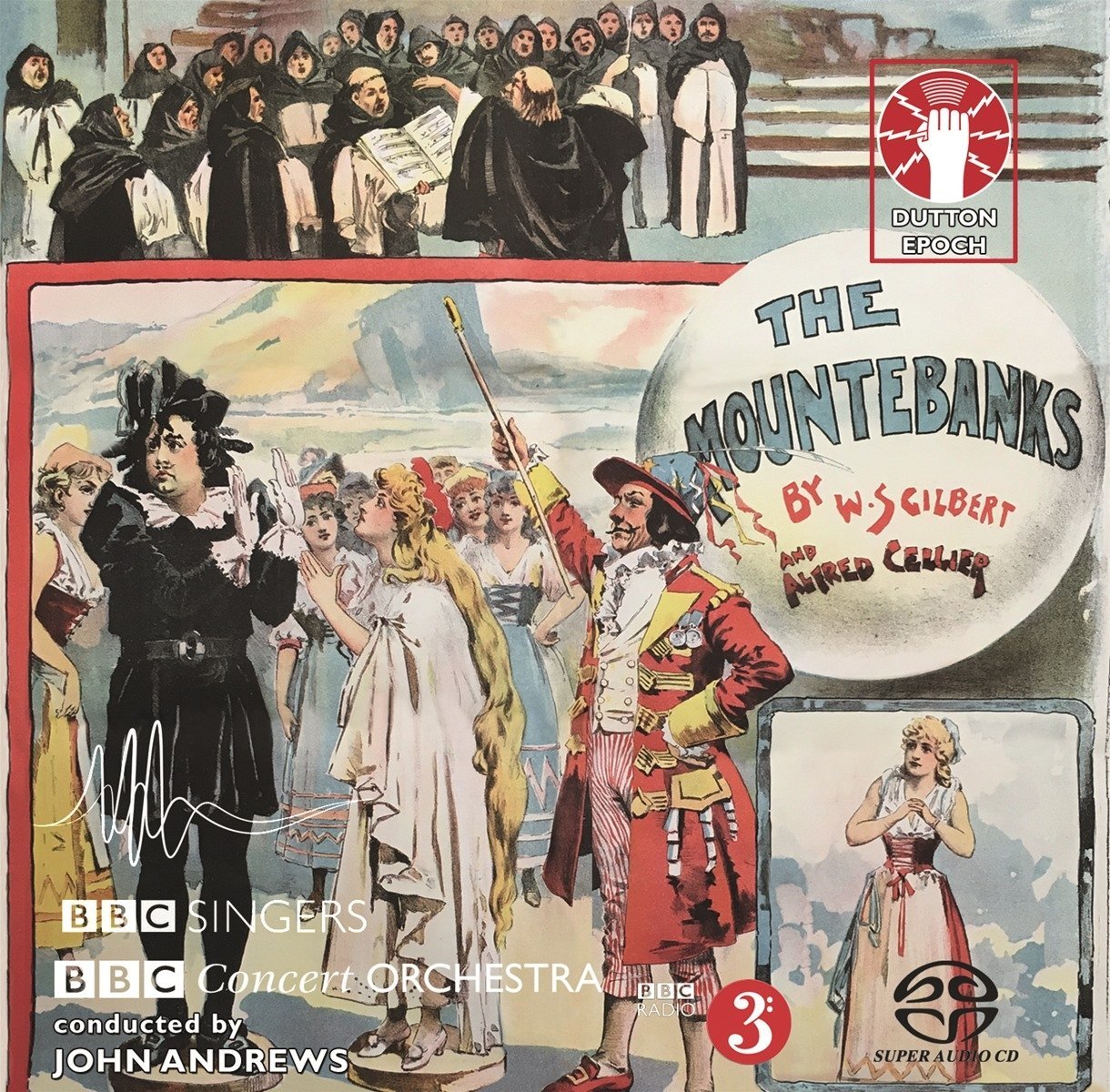
The 2018 recording of “The Mountebanks” on Dutton Vocalion.
Finally, Sedger entrusted Caryll with the composition of his first full score since The Lily of Léoville. The manager had used a sexy little American performer called May Yohé in his production of Albéniz’s The Magic Opal and he now (convinced by a large cash injection from the lady and her lordly backer) decided to have a piece written specially for her. The result was a latter-day burlesque called Little Christopher Columbus for which Caryll, handicapped by a star with a vocal range of about an octave, composed a set of songs which finally put him on the road to success as a theatre writer. From a delightful light score which danced neatly between the comic opera style of Dorothy and La Cigale and a refined kind of music-hall writing, Miss Yohé’s coon song ‘Oh Honey, My Honey’ and the ballad ‘Lazily, Drowsily’ became enormous popular hits, and both the ballads and the comedy numbers showed that the well-educated and versatile Caryll was an ideal composer for that new type of musical theatre, part comic opera and part burlesque, which was now becoming popular.
The ever-watchful George Edwardes was quick to realise this and, at the end of the run of Little Christopher Columbus, Caryll made the move from the Lyric to the Gaiety. The success of Little Christopher was soon confirmed by Caryll’s score for the landmark production of The Shop Girl (‘Love on the Japanese Plan’, ‘Over the Hills’) and the 33 year-old musician settled firmly in as composer-in-residence and musical director at the Gaiety Theatre. He remained there for 15 years, baton in hand, supplying music for all the great hits of that fmaous theatre’s most prosperous period from The Shop Girl (1894) through to Our Miss Gibbs (1909). Under Edwardes’s aegis, a writing partnership with Lionel Monckton evolved, beginning with Monckton as a subsidiary ‘additional songs’ partner, but later on more equal terms, with both partners turning out much of the best of the light theatre music on the London stage in its most successful Victorian and Edwardian years.
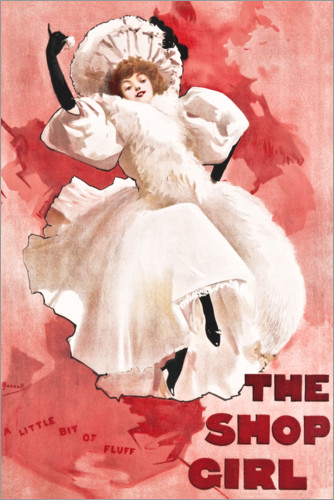
“A little bit of fluff”? Poster for “The Shop Girl.”
After his move to the Gaiety, Caryll continued to work for Sedger. An attempted follow-up for May Yohé called Dandy Dick Whittington failed under the double handicap of an old pantomime book and the lady’s cavalier attitudes to work, but when Sedger brought the touring musical The Gay Parisienne to town, and had it equipped with a particularly catchy replacement Caryll score, it proved a mighty success, both at home and overseas. The Caryll version continued to tour Britain for several decades. Amongst other ‘outside’ work, he provided a new score for Vanloo and Leterrier’s L’Étoile for D’Oyly Carte, composed the music for George Dance’s unhappy The Ladies’ Paradise and provided additional songs for two of the biggest hits of the era, Florodora and A Chinese Honeymoon. The soon faded Miss Yohé gave him an additional Broadway showing by introducing his ‘Down by the River’ and ‘Kiss Me to Sleep’ into Broadway’s The Giddy Throng (1900).
As Edwardes spread his production arm further afield, Caryll was given the opportunity to vary his style from the regular Gaiety formula, and the early years of the new century saw him turn out some of his best work both in the musical comedy manner with the charming The Girl from Kay’s and in the light opera vein with The Duchess of Dantzic, a piece begun in his Prince of Wales Theatre days and originally intended as a vehicle for Florence St John. Evie Greene played the titular Madame Sans-Gêne, equipped with a score which echoed the most attractive tones of French opéra-comique. The Earl and the Girl, written with Seymour Hicks and staged by William Greet with the remnants of the D’Oyly Carte Opera Company, was another notable Caryll success in this period. At Christmas 1903, Caryll had the until recently unparallelled distinction of having five musicals running at the same time in the West End of London (The Girl from Kays, The Duchess of Dantzic, The Orchid, The Earl and the Girl, The Cherry Girl).
In 1910, with Our Miss Gibbs still giving him one of the greatest successes of his career, Caryll decided to leave both the Gaiety and Britain and head for New York. Still not 50 years old, he had plenty left to give, but the feeling at the Gaiety was changing and Edwardes, as he had always done, was looking for new ways and new faces to keep the old theatre ahead of the times. Caryll had worked with the American librettist C M S McLellan on a piece called Nelly Neil in an ill-judged attempt to provide Edna May with a West-End successor to The Belle of New York, and the pair joined forces again in New York with a series of musicals based, like The Girl from Kay’s, on modern French comic plays, a series which attempted, with some success, to rival the current fashion for Viennese operetta.
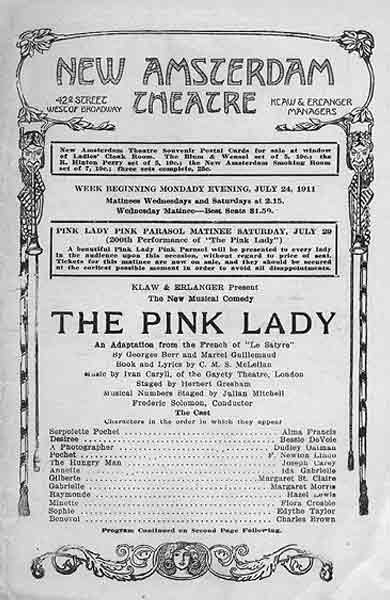
Program for “The Pink Lady” at the New Amsterdam Theatre.
Caryll, whose talent was a chameleon one, made the transition with aplomb and his second Broadway venture, The Pink Lady, in particular, proved as great a success as his English shows. While everything that was singable in Vienna was making its way to America, The Pink Lady (adapted from the Parisian farce Le Satyre) actually made the reverse trip to play London, Paris and Budapest. Its most famous tune, the Pink Lady Waltz (‘My Beautiful Lady’), which remains one of Caryll’s best known numbers, resurfaced as recently as 1988 in the score of the London Palladium extravaganza, Ziegfeld. A musical version of the Paris farce La Grimpette under the title Oh! Oh! Delphine was another delightful and happily exported triumph, and a third piece built on the same strong-booked principle, The Little Café, if not quite such a hit as the previous two, nevertheless did well.
Caryll’s subsequent Broadway shows included three successful fairytale-style musical comedies written to feature comedian Fred Stone, at first with his partner, Dave Montgomery (Chin-Chin) and, following Montgomery’s death, alone (Jack o’ Lantern, ‘Wait Till the Cows Come Home’, Tip Top). At the same time, George Grossmith picked up his latest French-based musical comedy, The Girl Behind the Gun, and transferred it to London under the title Kissing Time to open the new Winter Garden Theatre. It was a huge success, and Caryll returned to London for one last Gaiety musical, a version of the Paris farce Un coup de téléphone called The Kiss Call (1919).
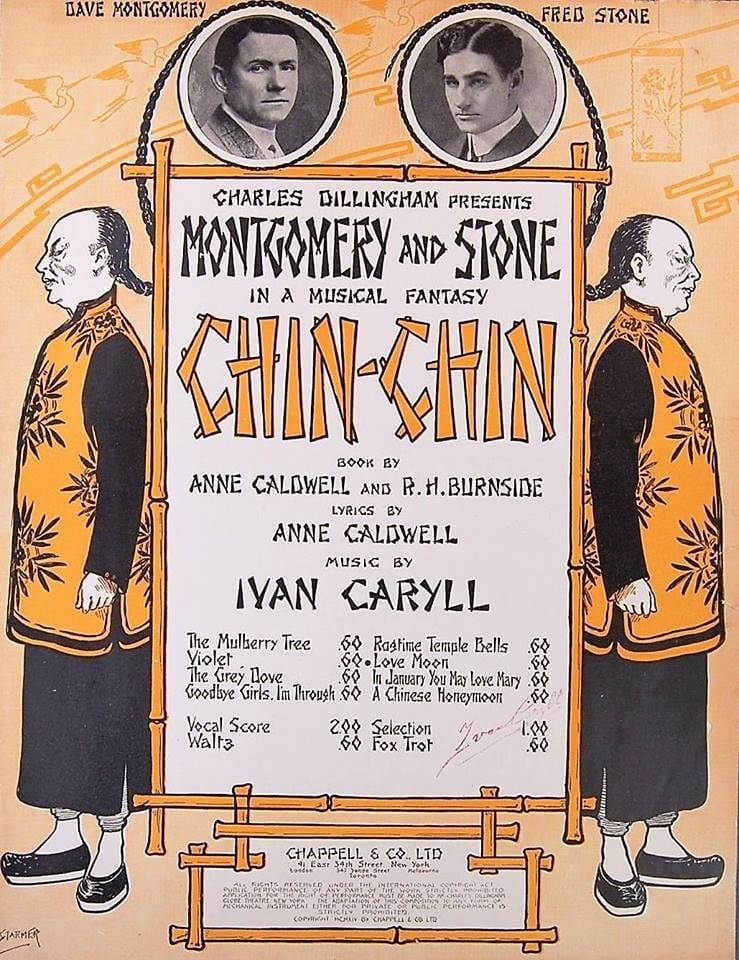
Sheet music cover for various songs from “Chin Chin.”
His final shows did a little less well. Both were musical comedies — one adapted from Adolf Philipp’s touring musical Mimi as Kissing Time (borrowing the title of the London version of The Girl Behind the Gun), the other a version of the international comedy hit Le Souris d’hotel, played as Little Miss Raffles and then as The Hotel Mouse – and both were produced on Broadway, the latter posthumously, with only relative success.
During his whole career in both England and America, Caryll maintained close links with the European, and particularly the Parisian theatre and, indeed, kept a richly appointed home in France to which he repaired regularly with his current wife and children. He continued to write songs and incidental music for Parisian comedies – notably La Marraine de Charley, the French version of the English farce Charley’s Aunt (‘La Canotière d’Oxford’, ‘Le Chanson des Houblons’ and a version of ‘Honey, My Honey’) – and five of his English-language musicals (Le Toréador, La Demoiselle de magasin, Les Jolies Filles de Gottenberg, La Dame en Rose, Hello!! Charley otherwise The Earl and the Girl) received Paris productions in a period when the products of the English stage were largely shunned by the French.
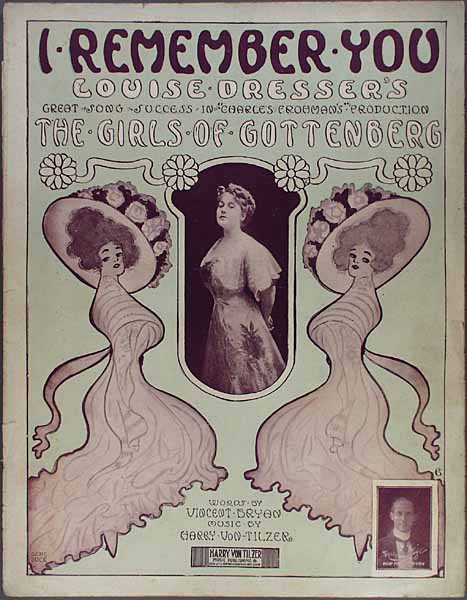
Sheet music cover for “I remember you” from “The Girls of Gottenberg.”
Although these imports gained some considerable success, the musical S. A.R. (1908), a version of the hit play Le Prince Consort written specifically for Paris, was probably the most interesting amongst those of his works seen in France. Caryll also composed one score, for the spectacular Die Reise nach Cuba, specifically for Gábor Steiner’s Venedig in Wien pleasure-garden theatre in Vienna, another city which had welcomed versions of his British musicals (Die Ladenmamsell, Das Cirkusmädel, Der Toreador, Ein durchgeganges Mädel, Miss Gibbs, Der Laufbursche, Die verhexte Wien[erstadt] ad from The New Aladdin).
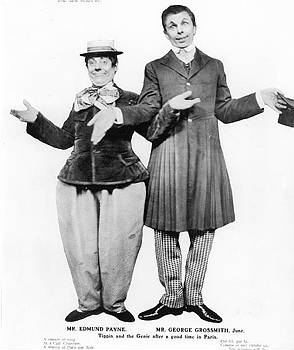
Edmund Payne and George Grossmith (as the Genie) in “The New Aladdin.”
Caryll’s career encompassed three eras of musical theatre and he seemed to be equally happy in each of them. If his greatest successes were made in the light musical comedy area, epitomized by the Gaiety Theatre shows in which he made his name, he proved with scores as divergent as the classic operetta The Duchess of Dantzic and S.A.R. on the one hand and the post-war The Girl Behind the Gun, with its modern fox-trot and one-step rhythms, on the other, that he was a theatre composer who, unlike his contemporaries Lionel Monckton and Sidney Jones, could and would move with times and musical styles. His scores for The Pink Lady and Oh! Oh! Delphine, a pair of shows which marked a turning towards a more intimate, book-based kind of musical play on the Broadway stage, contain numbers which equal the best that both the Viennese waltz-masters and the new wave of American dance-songwriters were writing in the years around the First World War. A true theatre composer of his time, he was equally as capable of turning out a complicated finale or concerted number as he was a catchy point number or comedy song but, largely because so much of his work was written for a kind of show which was by its nature ephemeral, few of his songs have survived as standards.
Caryll was married for a period to the American vocalist Geraldine Ulmar and later to another performer, dancer Maud Hill (tour Morocco Bound, t/o King Kodak, Edgeworth Bess in Little Jack Sheppard rev,Maud Plantaganet in The Shop Girl etc). His daughter Primrose Caryll was seen as a musical comedy performer on the American stage in a modest career (Fairy Godmother/Renée in Criss Cross, &c) which included an appearance in her father’s Kissing Time, whilst his son Felix Caryll took minor rôles in several London musicals (Mr Whittington 1933 etc).
Caryll died in New York on 29 November, 1921.
1886 The Lily of Léoville (Félix Rémo ad Alfred Murray) Comedy Theatre 10 May
1887 Jubilation (‘Richard Henry’) 1 act Prince of Wales Theatre 14 May
1888 Warranted Burglar Proof (w Henry Leslie/B C Stephenson) 1 act Prince of Wales Theatre 31 March
1889 Love’s Trickery (Cunningham Bridgman) 1 act Lyric Theatre 31 August
1890 La Cigale (La Cigale et la fourmi) additional music for English version w F C Burnand (Lyric Theatre)
1890 The Sentry 1 act (Rémo, T Murray Watson) Lyric Theatre 5 April
1891 Miss Decima (Miss Helyett) additional music for revised English version w F C Burnand (Criterion Theatre)
1891 Love and Law (Frank Latimer) 1 act Lyric Theatre 4 March
1892 Ma mie Rosette revised English version w George Dance (Globe Theatre)
1892 Opposition (‘Richard Henry’) 1 act Lyric Theatre 28 June
1893 Little Christopher Columbus (USA: Little Christopher) (George R Sims) Lyric Theatre 10 October
1894 The Shop Girl (w Lionel Monckton/Adrian Ross, H J W Dam/Dam) Gaiety Theatre 24 November
1894 The Yaller Girl (Sims) 1 act Moore and Burgess Minstrels 31 December
1895 Dandy Dick Whittington (aka The Circus Boy) (Sims) Avenue Theatre 2 March
1895 Uncle Tom’s Cabin (Sims) tableaux vivants Moore & Burgess Minstrels, St James’s Hall 7 October
1896 The Gay Parisienne (USA: The Girl from Paris) (w others/George Dance) Duke of York’s Theatre 4 April
1896 The Circus Girl (w Monckton/Harry Greenbank, Ross/Walter Palings, James T Tanner) Gaiety Theatre 5 December
1897 La Beigneuse (Sims) 1 act Palace Theatre ****
1898 A Runaway Girl (w Monckton/H Greenbank, Aubrey Hopwood/Seymour Hicks, Harry Nicholls) Gaiety Theatre 21 May
1899 The Lucky Star (L’Étoile) new score for English version w Charles H E Brookfield Savoy Theatre 7 January
1900 The Messenger Boy (w Monckton/Ross, Percy Greenbank/Murray, Tanner) Gaiety Theatre 3 February
1901 Die Reise nach Cuba (Leopold Krenn, Carl Lindau) Venedig in Wien, Vienna 3 August
1901 The Ladies’ Paradise (George Dance) Theatre Royal, Hanley 11 March
1901 The Toreador (w Monckton/P Greenbank, Ross/Nicholls, Tanner) Gaiety Theatre 17 June
1902 The Girl from Kays (w Cecil Cook/Owen Hall) Apollo Theatre 15 November
1903 The Duchess of Dantzic (Henry Hamilton) Lyric Theatre 17 October
1903 The Orchid (w Monckton/Ross, P Greenbank/Tanner) Gaiety Theatre 28 October
1903 The Earl and the Girl (P Greenbank/Hicks) Adelphi Theatre 10 December
1903 The Cherry Girl (Hopwood/Hicks) Vaudeville Theatre 21 December
1905 The Spring Chicken (Ross, Greenbank/Grossmith) Gaiety Theatre 30 May
1906 The Little Cherub (aka The Girl on the Stage) (Ross/Owen Hall) Prince of Wales Theatre 13 January
1906 The New Aladdin (w Monckton/Ross, Greenbank et al/Tanner, W H Risque) Gaiety Theatre 29 September
1907 Nelly Neil (C M S McLellan) Aldwych Theatre 10 January
1907 The Girls of Gottenberg (Ross et al/Grossmith, L E Berman) Gaiety Theatre 15 May
1908 Son Altesse Royale (S.A.R.) (Léon Xanrof, Jules Chancel) Théâtre des Bouffes-Parisiens, Paris 11 November
1909 Our Miss Gibbs (Ross, P Greenbank/Tanner et al) Gaiety Theatre 23 January
1911 Marriage à la Carte (McLellan) Casino Theater, New York 2 January
1911 The Pink Lady (McLellan) New Amsterdam Theater, New York 13 March
1912 Oh! Oh! Delphine (McLellan) Knickerbocker Theater, New York 30 September
1913 The Little Café (McLellan) New Amsterdam Theater, New York 10 November
1914 The Belle of Bond Street revised The Girl from Kays Shubert Theater, New York 30 March
1914 Chin-Chin (Anne Caldwell, James O’Dea/Caldwell, R H Burnside) Globe Theater, New York 20 October
1914 Papa’s Darling (H B Smith) New Amsterdam Theater, New York 2 November
1917 Jack o’ Lantern (Caldwell, Burnside) Globe Theater, New York 16 October
1918 The Girl Behind the Gun (aka Kissing Time) (Guy Bolton, P G Wodehouse) New Amsterdam Theater, New York 16 September
1918 The Canary (Wodehouse, Caldwell/ Louis Verneuil ad H B Smith) Globe Theater, New York 4 November
1919 The Kiss Call (P Greenbank, Ross, Clifford Grey/Fred Thompson) Gaiety Theatre 8 October
1919 Kissing Time revised version of The Girl Behind the Gun Winter Garden Theatre, London 20 May
1920 Tip-Top (Caldwell, Burnside) Globe Theater, New York 5 October
1920 Kissing Time (Philander Chase Johnson, Grey, Irving Caesar/George Hobart) Lyric Theater, New York 11 October
1921 Little Miss Raffles (Grey/Guy Bolton) Stamford, Conn 1 December
1922 The Hotel Mouse revised Little Miss Raffles w Armand Vecsey Shubert Theater, New York 13 March
